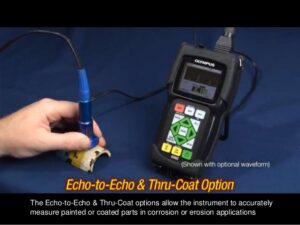What is Ultrasonic Thickness Testing ?
Ultrasonic Testing
Ultrasonic Testing utilizes high frequency sound waves which are not audible to human ears.
The Ultrasonic sound waves are used for measurements of thickness of any material.
General frequency used in ultrasonic thickness measurements probe is 5 Mega Hertz and above.
The probe is placed over the material surface with a liquid or gel spread over the surface.
The liquid may be water, oil or gel, which acts as couplant and the couplant eliminates air gap between probe and material.
Sound from the probe travels throughout the material and reflects back when it meets the end of the material. When it meets another material with a different acoustic property, by having the time taken by sound to travel to end and return back the machine calculates accurately the thickness of the material.
The technology is very useful to measure thickness of complex profiles and hollow sections, where there is no access on the inner side of the sections.
Ultrasonic Thickness Testing
UTT – Ultrasonic Thickness Testing is used in process of inspection of pipelines, tanks, heat exchangers and pressure vessels.
The method allows us to do corrosion maping and clearly inspect the corroded areas and identifying the rate of corrosion, which gives us data to decide the serviceability of the pipelines and tanks.

The American standard for Ultrasonic Thickness Testing is ASTM E797.
And ISO standard for Ultrasonic Thickness Testing is ISO 16809:2017
For any further information about Ultrasonic Measurements, for material testing service, third party inspection service or training and certification for Non Destructive Testing Methods visit https://aqcinspection.com/
Visit our technical and career updates at our Blog site https://advancedqualitycentre.blogspot.com . https://ndtcenter.blogspot.com our website https://aqcinspection.com/news-events/ for many more blogs to learn more.

Comments
Post a Comment